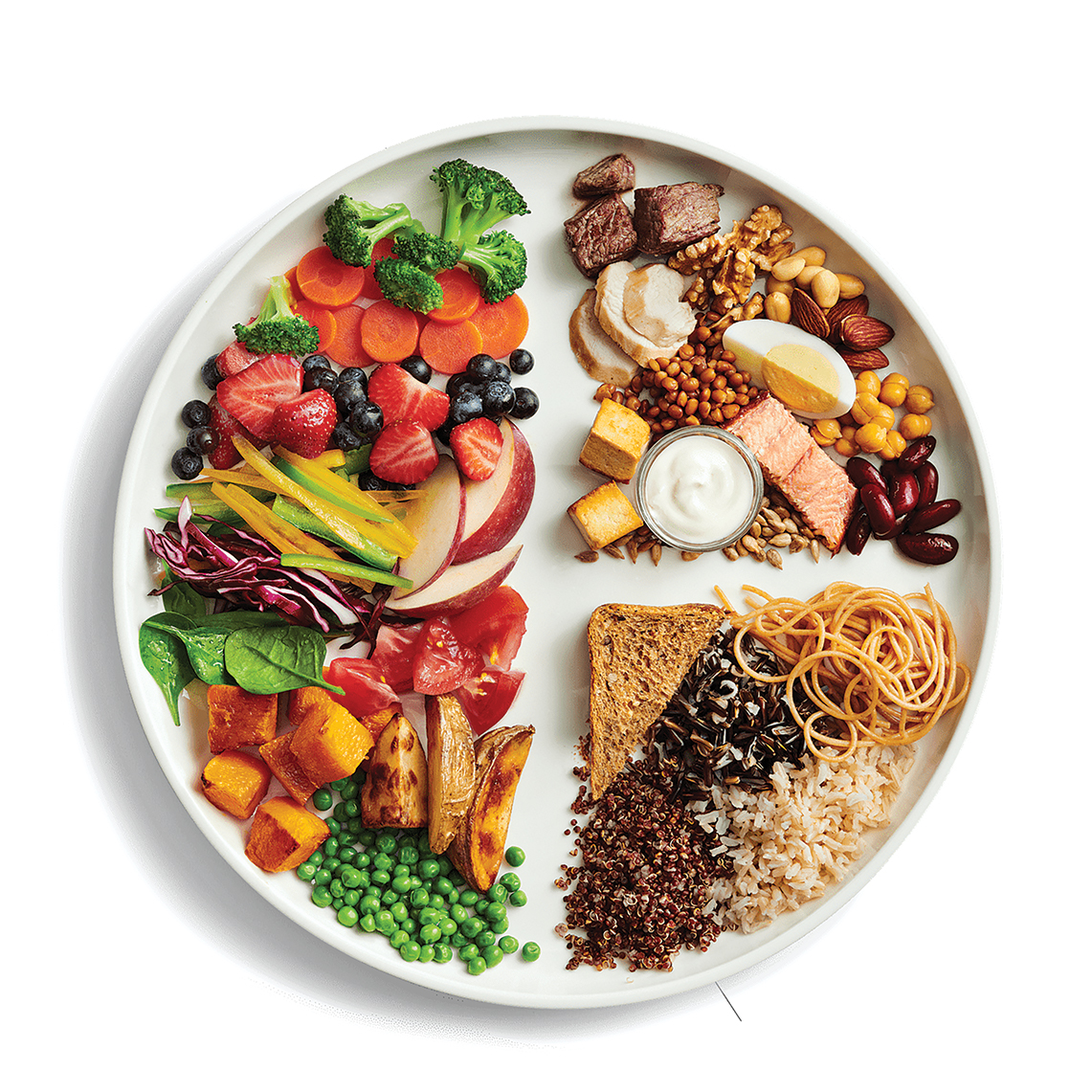In the realm of health and well-being, a well-balanced diet reigns supreme as the cornerstone of vibrant living. Embracing a nutritious and diverse array of foods empowers individuals to optimize their physical, mental, and emotional health. This comprehensive guide delves into the essence of well-balanced diets, providing a blueprint for navigating the nutritional landscape towards a life of optimal health.
Deconstructing Well-Balanced Diet Meaning: A Foundation for Healthy Choices

A well-balanced diet is a carefully curated tapestry of foods that collectively provide the essential nutrients required for optimal bodily function. It encompasses a rainbow of fruits, vegetables, whole grains, lean proteins, and healthy fats, each contributing unique elements to the symphony of health. By adhering to the principles of balance and variety, individuals can ensure that their nutritional needs are met, promoting overall well-being.
Fruits and Vegetables: Nature’s Vibrant Bounty
Fruits and vegetables teem with an arsenal of vitamins, minerals, fiber, and antioxidants. Their consumption has been associated with reduced risk of chronic diseases, such as heart disease, stroke, type 2 diabetes, and some types of cancer.
Fruits and vegetables come in a wide array of colors, each hue representing a unique set of phytochemicals that offer distinct health benefits. For instance, leafy greens like spinach and kale are rich in vitamin K, which is essential for blood clotting and bone health. Citrus fruits, such as oranges and lemons, are abundant in vitamin C, a powerful antioxidant that supports immune function and collagen production.
To ensure a well-balanced intake of fruits and vegetables, it is recommended to aim for a minimum of five servings per day, with a diversity of colors and varieties. This can be achieved through creative meal planning and snacking on nutrient-dense produce throughout the day.
| Fruit/Vegetable | Nutrient Highlight |
|---|---|
| Spinach | Vitamin K, Folate, Magnesium |
| Blueberries | Antioxidants, Vitamin C, Fiber |
| Sweet Potatoes | Vitamin A, Vitamin C, Fiber |
| Broccoli | Vitamin C, Vitamin K, Fiber |
- Incorporate a variety of fruits and vegetables into your daily meals and snacks.
- Aim for a minimum of five servings of fruits and vegetables per day.
- Choose a range of colors to ensure a diverse intake of phytochemicals.
Whole Grains: The Cornerstone of Nutritious Diets
Whole grains provide a sustained source of energy, thanks to their rich fiber content and complex carbohydrate structure. They have been linked to a reduced risk of chronic diseases, such as heart disease, type 2 diabetes, and certain types of cancer.
Whole grains, unlike their refined counterparts, retain the entire grain kernel, including the nutrient-rich germ and bran. This means that they offer a more comprehensive nutritional profile, boasting higher levels of B vitamins, iron, magnesium, and fiber.
Common examples of whole grains include:
- Brown rice
- Whole wheat bread and pasta
- Oats
- Quinoa
- Bulgur
- Barley
Incorporating whole grains into your diet can be as simple as swapping refined grains for their whole-grain alternatives. This simple change can have a significant impact on your overall health and well-being.
| Whole Grain | Nutrient Highlight |
|---|---|
| Brown Rice | Magnesium, Selenium, Fiber |
| Oats | Soluble Fiber, Beta-Glucan, Protein |
| Quinoa | Protein, Fiber, Magnesium |
- Choose whole grains over refined grains whenever possible.
- Experiment with a variety of whole grain options to add diversity to your diet.
- Aim for at least three servings of whole grains per day.
Lean Proteins: The Building Blocks of a Healthy Body
Lean proteins are essential for the growth, repair, and maintenance of body tissues. They play a crucial role in the production of enzymes, hormones, and antibodies, which are crucial for overall health and well-being.
Lean protein sources include:
- Poultry (e.g., chicken, turkey)
- Fish and seafood (e.g., salmon, tuna, shrimp)
- Legumes (e.g., lentils, chickpeas, black beans)
- Lean cuts of red meat (e.g., sirloin, round, flank)
- Eggs
- Tofu and tempeh
Incorporating a variety of lean protein sources into your diet can help you meet your daily protein requirements while also providing additional nutrients, such as omega-3 fatty acids, iron, and zinc.
| Protein Source | Nutrient Highlight |
|---|---|
| Salmon | Omega-3 Fatty Acids, Protein, Vitamin D |
| Lentils | Protein, Fiber, Iron |
| Eggs | Protein, Vitamin B12, Choline |
- Aim for 20-30 grams of lean protein per meal.
- Choose a variety of lean protein sources to ensure a diverse nutrient intake.
- Incorporate plant-based proteins, such as legumes, into your diet for additional health benefits.
Healthy Fats: The Cornerstone of Cellular Health
Contrary to popular belief, not all fats are created equal. Healthy fats, such as those found in avocados, nuts, seeds, and fatty fish, play a vital role in various bodily functions, including hormone production, brain health, and immune function.
Healthy fats can be divided into three main categories:
- Monounsaturated fats: Found in foods like olive oil, avocados, and nuts, these fats can help lower LDL (bad) cholesterol and raise HDL (good) cholesterol.
- Polyunsaturated fats: These fats, found in foods like fatty fish, flaxseeds, and walnuts, are essential for brain health and reducing inflammation.
- Omega-3 fatty acids: A type of polyunsaturated fat, omega-3s are crucial for heart health, cognitive function, and reducing the risk of chronic diseases.
Incorporating healthy fats into your diet can help you feel more satisfied and promote overall well-being.
| Healthy Fat Source | Nutrient Highlight |
|---|---|
| Avocado | Monounsaturated Fats, Vitamin E, Potassium |
| Walnuts | Polyunsaturated Fats, Omega-3s, Protein |
| Fatty Fish (Salmon) | Omega-3 Fatty Acids, Protein, Vitamin D |
- Aim for a balanced intake of healthy fats, such as monounsaturated and polyunsaturated fats.
- Incorporate sources of omega-3 fatty acids, such as fatty fish, into your diet regularly.
- Limit your consumption of saturated and trans fats, which can be detrimental to your health.
Hydration: The Foundation of a Well-Balanced Diet
Proper hydration is a critical component of a well-balanced diet, as it supports a wide range of bodily functions. Water makes up approximately 60% of our body weight and plays a vital role in regulating body temperature, transporting nutrients, and eliminating waste.
The recommended daily water intake can vary based on factors such as age, gender, activity level, and overall health status. As a general guideline, the U.S. National Academies of Sciences, Engineering, and Medicine recommend that women consume approximately 11.5 cups (2.7 liters) of fluids per day, while men should aim for 15.5 cups (3.7 liters) of fluids per day.
It’s important to note that the term “fluids” includes not only water but also other beverages, such as herbal tea, milk, and broths. Additionally, many fruits and vegetables, such as watermelon, cucumbers, and tomatoes, contain a significant amount of water and can contribute to your overall hydration needs.
Staying well-hydrated throughout the day can help you maintain optimal bodily function, support cognitive performance, and enhance overall well-being.
| Hydration Tip | Benefit |
|---|---|
| Drink water consistently throughout the day | Supports kidney function and waste removal |
| Carry a reusable water bottle | Encourages frequent water consumption |
| Eat water-rich fruits and vegetables | Provides additional hydration from food sources |
- Aim for the recommended daily water intake based on your age, gender, and activity level.
- Stay hydrated by drinking water consistently throughout the day.
- Incorporate water-rich fruits and vegetables into your diet to supplement your fluid intake.
Crafting a Well-Balanced Meal Plan: A Step-by-Step Guide

Developing a well-balanced meal plan is a powerful tool for achieving optimal health and wellness. By thoughtfully combining the essential food groups and incorporating a variety of nutrient-dense options, you can ensure that your body is receiving the necessary vitamins, minerals, and macronutrients to thrive.
Establishing Nutritional Priorities
Before crafting your meal plan, it’s essential to identify your specific nutritional needs and priorities. Consider factors such as your age, gender, activity level, and any health conditions or dietary restrictions you may have. This information will help you tailor your meal plan to meet your unique requirements.
Balancing Macronutrients
Macronutrients are the primary components of the food we consume, and they include carbohydrates, proteins, and fats. A well-balanced meal plan should aim to distribute these macronutrients in the following proportions:
- Carbohydrates: 45-65% of total daily calories
- Proteins: 10-35% of total daily calories
- Fats: 20-35% of total daily calories
By ensuring that each meal includes a balance of these macronutrients, you can promote sustained energy, support muscle growth and repair, and maintain overall metabolic health.
Incorporating Micronutrients
Micronutrients, such as vitamins and minerals, are essential for a wide range of bodily functions, from immune system support to bone health. Ensuring a diverse intake of fruits, vegetables, whole grains, and lean proteins can help you meet your micronutrient needs and promote overall well-being.
Meal Planning Strategies
Crafting a well-balanced meal plan requires thoughtful planning and preparation. Here are some strategies to help you get started:
- Create a Weekly Meal Plan: Sit down at the beginning of each week and plan out your meals, taking into account your schedule, preferences, and available ingredients.
- Batch Cook and Meal Prep: Set aside time on the weekend or a designated day to prepare larger portions of healthy meals that can be portioned out and enjoyed throughout the week.
- Experiment with New Recipes: Explore new, nutrient-dense recipes that incorporate a variety of whole foods, allowing you to expand your culinary horizons and add more diversity to your diet.
- Involve the Whole Family: Engage your family in the meal planning and preparation process, encouraging everyone to contribute ideas and participate in the cooking. This not only promotes a well-balanced diet but also fosters a sense of community and healthy habits.
- Utilize Seasonal Produce: Take advantage of the abundance and freshness of seasonal fruits and vegetables, which can add unique flavors and nutrients to your meals.
By following these strategies and maintaining a focus on balance and variety, you can create a well-balanced meal plan that supports your overall health and well-being.
Overcoming Obstacles and Staying Motivated
Transitioning to a well-balanced diet can be a journey filled with both challenges and rewards. Acknowledging potential obstacles and developing strategies to overcome them can help you stay on track and achieve long-term success.
Common Challenges and Solutions
- Time Constraints: Preparing healthy meals can seem time-consuming, especially in today’s fast-paced world. To overcome this, incorporate meal prepping, utilize convenient kitchen appliances, and find simple, nutrient-dense recipes that can be quickly assembled.
- Taste Preferences: Adjusting to the flavors of a well-balanced diet may take time, especially if you’re used to less-healthy options. Experiment with new herbs, spices, and cooking techniques to enhance the taste of your meals, and gradually introduce new foods to your palate.
- Budget Concerns: Eating a well-balanced diet can sometimes be perceived as more expensive. However, with strategic planning and purchasing, you can find cost-effective ways to incorporate nutritious foods into your meals. Opt for affordable whole foods, shop in-season, and look for sales and discounts.
- Dining Out and Social Situations: Navigating social events and dining out can present challenges when trying to maintain a well-balanced diet. Research restaurant menus in advance, choose healthier options, and don’t be afraid to politely request modifications to your meal.
- Emotional Eating and Cravings: Emotional triggers and cravings for less-healthy foods can make it difficult to stick to a well-balanced diet. Develop coping strategies, such as mindful eating, keeping a food journal, and having healthy snacks on hand to curb cravings.
Staying Motivated and Celebrating Progress
Maintaining a well-balanced diet requires a long-term commitment, and staying motivated can be crucial to your success. Celebrate small victories, set achievable goals, and engage in activities that promote overall well-being, such as regular exercise and getting enough sleep.
Remember, a well-balanced diet is not a short-term fix but rather a lifelong journey towards optimal health and wellness. Embrace the process, be patient with yourself, and enjoy the numerous benefits that a nutritious, diverse diet can bring to your life.
A well-balanced diet is the foundation for a vibrant, healthy life. By embracing a diverse array of fruits, vegetables, whole grains, lean proteins, and healthy fats, individuals can unlock the key to optimal physical, mental, and emotional well-being. This comprehensive guide has provided a blueprint for navigating the nutritional landscape, empowering you to make informed choices that support your holistic health.
Remember, a well-balanced diet is not a one-size-fits-all approach. It’s a personalized journey that requires mindfulness, flexibility, and a deep understanding of your unique needs. By crafting a meal plan that aligns with your specific goals and preferences, you can unlock the secrets to a life of vitality, longevity, and overall wellness.
Embrace the power of a well-balanced diet and embark on a transformative path towards optimal health. Your body, mind, and spirit will thank you.
